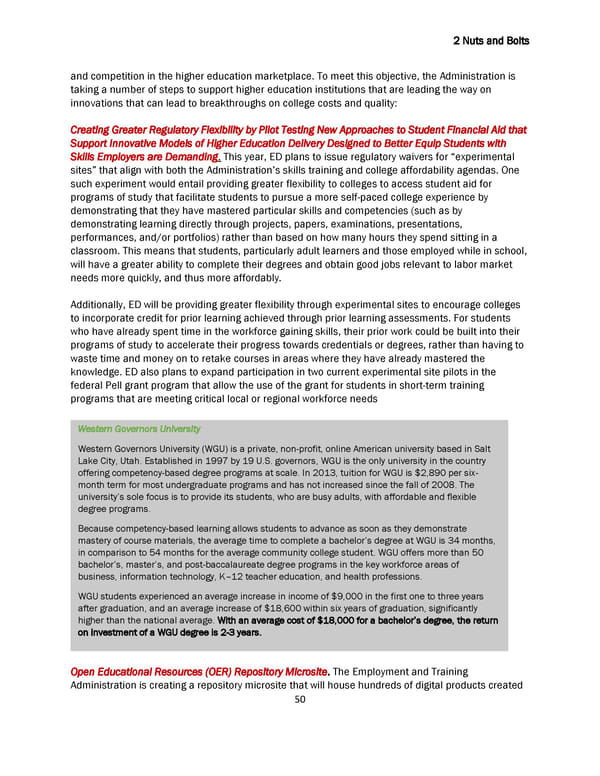2 Nuts and Bolts and competition in the higher education marketplace. To meet this objective, the Administration is taking a number of steps to support higher education institutions that are leading the way on innovations that can lead to breakthroughs on college costs and quality: Creating Greater Regulatory Flexibility by Pilot Testing New Approaches to Student Financial Aid that Support Innovative Models of Higher Education Delivery Designed to Better Equip Students with Skills Employers are Demanding. This year, ED plans to issue regulatory waivers for “experimental sites” that align with both the Administration’s skills training and college affordability agendas. One such experiment would entail providing greater flexibility to colleges to access student aid for programs of study that facilitate students to pursue a more self-paced college experience by demonstrating that they have mastered particular skills and competencies (such as by demonstrating learning directly through projects, papers, examinations, presentations, performances, and/or portfolios) rather than based on how many hours they spend sitting in a classroom. This means that students, particularly adult learners and those employed while in school, will have a greater ability to complete their degrees and obtain good jobs relevant to labor market needs more quickly, and thus more affordably. Additionally, ED will be providing greater flexibility through experimental sites to encourage colleges to incorporate credit for prior learning achieved through prior learning assessments. For students who have already spent time in the workforce gaining skills, their prior work could be built into their programs of study to accelerate their progress towards credentials or degrees, rather than having to waste time and money on to retake courses in areas where they have already mastered the knowledge. ED also plans to expand participation in two current experimental site pilots in the federal Pell grant program that allow the use of the grant for students in short-term training programs that are meeting critical local or regional workforce needs Western Governors University Western Governors University (WGU) is a private, non-profit, online American university based in Salt Lake City, Utah. Established in 1997 by 19 U.S. governors, WGU is the only university in the country offering competency-based degree programs at scale. In 2013, tuition for WGU is $2,890 per six- month term for most undergraduate programs and has not increased since the fall of 2008. The university’s sole focus is to provide its students, who are busy adults, with affordable and flexible degree programs. Because competency-based learning allows students to advance as soon as they demonstrate mastery of course materials, the average time to complete a bachelor’s degree at WGU is 34 months, in comparison to 54 months for the average community college student. WGU offers more than 50 bachelor’s, master’s, and post-baccalaureate degree programs in the key workforce areas of business, information technology, K–12 teacher education, and health professions. WGU students experienced an average increase in income of $9,000 in the first one to three years after graduation, and an average increase of $18,600 within six years of graduation, significantly higher than the national average. With an average cost of $18,000 for a bachelor’s degree, the return on investment of a WGU degree is 2-3 years. Open Educational Resources (OER) Repository Microsite. The Employment and Training Administration is creating a repository microsite that will house hundreds of digital products created 50
 Biden Ready to Work White Paper 7/22/14 Page 49 Page 51
Biden Ready to Work White Paper 7/22/14 Page 49 Page 51